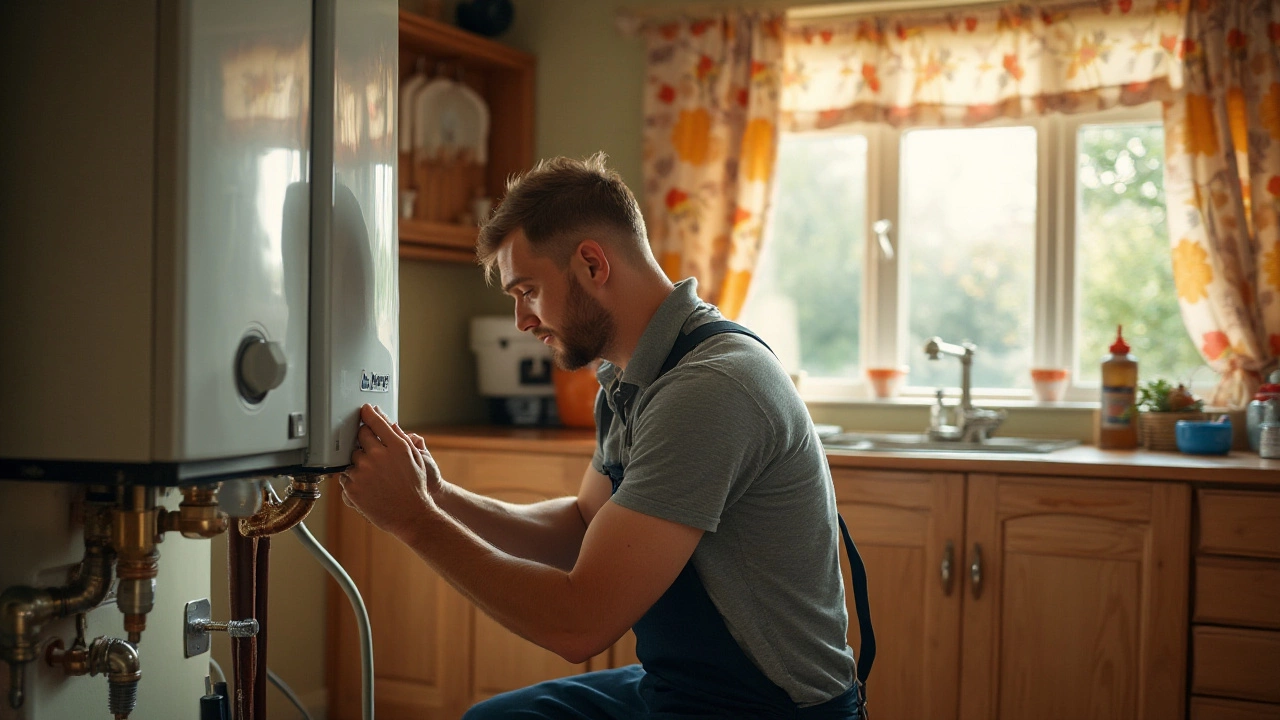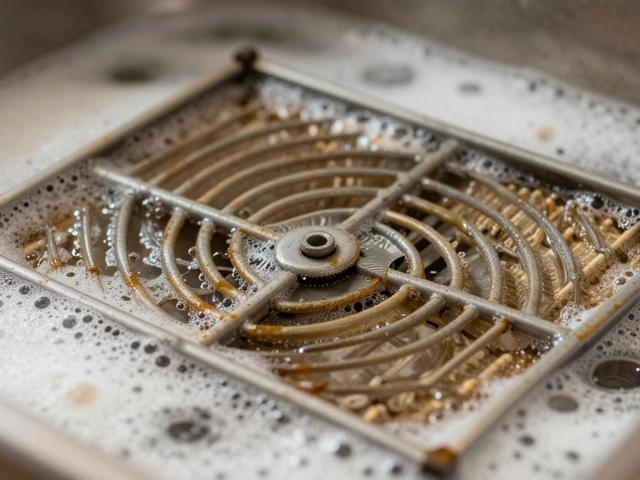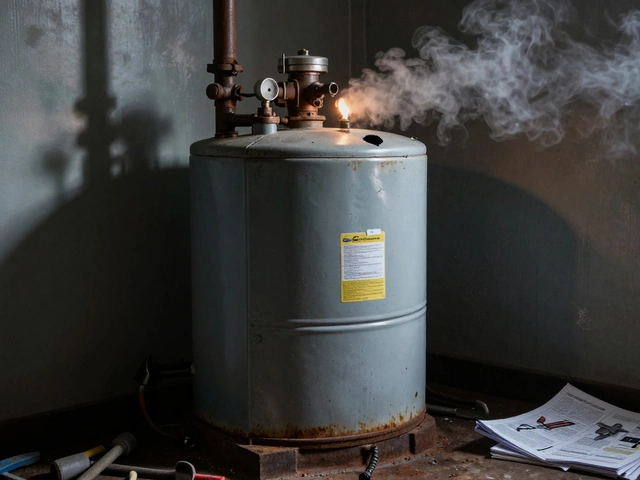When the chill of winter starts creeping in, the last thing you want is for your heating system to give out. But if you're dealing with an aging boiler, replacement might be on your horizon. Understanding how long it typically takes to replace a boiler can save you from unexpected cold spells—or endless calls to your heating engineer.
Boilers aren't all created equal, and neither is the time needed to replace them. Whether you're upgrading to a more energy-efficient model or replacing a boiler that simply gave up, knowing the ins and outs can streamline your experience. By preparing for every step of the process, from choosing the right type to understanding installation hurdles, you can make the shift to a new boiler not just necessary, but beneficial.
- Understanding Boiler Types
- Factors Affecting Replacement Time
- The Replacement Process
- Choosing the Right Professional
- Maintenance After Installation
Understanding Boiler Types
Choosing the right boiler for your home is not a one-size-fits-all kind of decision. That's because boilers come in various types and each type is suitable for specific needs and circumstances. Knowing these distinct categories can help you make an informed choice that ensures maximum efficiency and comfort. The most common types you’ll encounter are combi boilers, system boilers, and conventional boilers, each offering different features. Let's break down what makes each unique, so when you make a visit to your local supplier or consult with an expert, you know exactly what to ask.
Combi boilers, short for combination boilers, are often preferred for their compact size and efficiency. They provide hot water on demand and don’t require a separate storage tank. This makes them ideal for smaller homes or apartments where space is at a premium. The swift hot water delivery can be a big benefit, especially if the mornings in your household are a mad dash to beat traffic. With a combi boiler, you won't be waiting long for the shower to heat up. However, they might not be the best fit if you have high hot water needs, say for a large family with multiple bathrooms.
In contrast, system boilers can be more appropriate for homes with higher demand. They still require a cylinder for storing hot water, but all the major components are built into the unit, making installation a breeze compared to a conventional boiler system. They strike a balance by being compact and efficient, making them a popular choice in medium-sized households. If you're the kind of person who likes the idea of taking long, relaxing baths, you might find this system meeting your needs without a hitch. A good system boiler can support multiple outlets, ensuring everyone in your home gets hot water when they need it.
The third type, conventional boilers, also known as traditional, regular, or heat-only boilers, are best suited for homes that already have an older radiator system and a large space to accommodate the separate hot water cylinder and cold water tank. These systems are dependable for high-water usage demands, such as in large homes where several people might be using water simultaneously. While they might require more installation space, their efficiency can be top-notch when properly integrated with a home heating system that was designed around this type of setup. Plus, traditional systems often enjoy a reputation for reliability and long lifespan.
Interestingly, a survey by the Energy Saving Trust revealed a significant shift in the popularity of boiler types, with combi boilers becoming the primary choice in 70% of households in the last five years. This trend reflects how lifestyles and home designs have evolved towards more space-efficient solutions.
"The right boiler makes a substantial difference in home energy efficiency," says a report by the UK’s Green Alliance. "Choosing the right model can reduce your household’s energy bill by up to 25%."Such insights validate the importance of understanding boiler types before making a purchase.
Factors Affecting Replacement Time
Replacing a boiler is not a one-size-fits-all affair. Various elements come into play, influencing not only the duration but also the overall complexity of the task. One primary factor is the type of boiler you choose as your replacement. While combi boilers might take a day to swap out due to their compact and straightforward nature, a conventional boiler system, with its separate cylinder and water tank, could extend the time considerably. The intricacies of the plumbing and the location of your boiler can also significantly impact the timeline. If the current setup is easily accessible and doesn't require structural adjustments, the process is generally quicker.
Existing infrastructure matters too. If the current piping system is outdated or incompatible with modern heating systems, you might need to invest additional time and resources in bringing things up to speed. This often means not just discovering new pipelines but potentially upgrading water tanks and cylinders. Climate and season can subtly impact replacement timelines as well. For instance, during peak winter months, appointment slots with installers might be scarce, delaying the process. On the note of unexpected circumstances, consider factors such as the condition of the existing structure. If unforeseen complications like hidden corrosion or other damage become apparent once the old boiler is removed, engineers might need to pause to address those before continuing.
The skill and experience of the installer can also make a world of difference. A professional with years under their belt might navigate potential hurdles more adeptly, speeding up the process compared to someone newer to the trade. It's a smart move to do some research and potentially seek out recommendations for installers known for their expertise. Collaboration between customer and contractor is vital too. Being prepared, understanding your heating needs clearly, and having chosen the required model of energy-efficient boiler prior to the installation day can smooth the journey significantly. As Martin Lewis, a financial guru often noted for his consumer advice, puts it:
"A little prep goes a long way in home improvements—be diligent in planning, and the implementation will be less of a headache."
Of course, there's always the factor of unexpected delays or supply chain issues that could crop up, especially in the current era where deliveries aren't always as reliable as they once were. If your chosen boiler isn't available immediately, it may be wise to look into alternative models that can be installed sooner. To keep everything moving quickly, it's also beneficial to have a clear understanding of any necessary permits or regulations in your area. Neglecting these might mean unnecessary waiting periods for paperwork processing. Even post-installation, usually a few days might be needed to fully ensure everything works seamlessly. Engineers often test the system and make adjustments as needed, meaning that your newly installed boiler might need tweaking to reach peak efficiency.
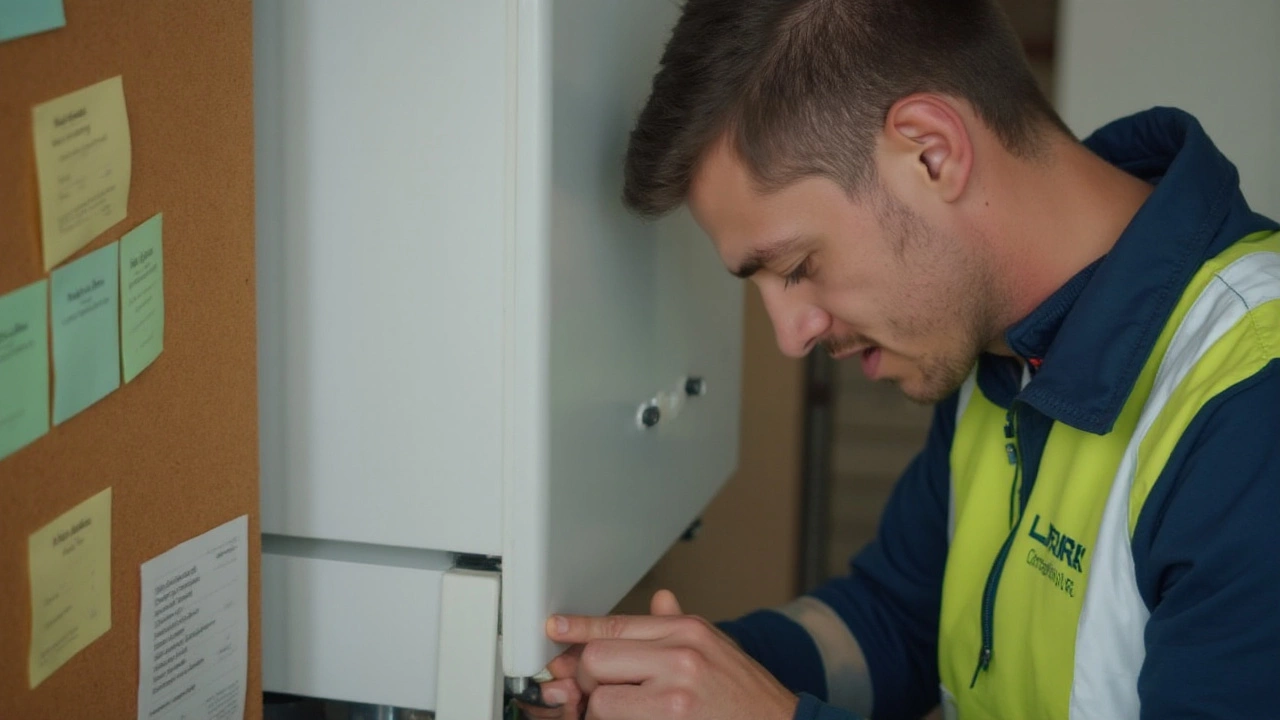
The Replacement Process
Replacing a boiler can initially seem daunting, akin to undergoing surgery for your home's heating system, but understanding the steps involved can demystify the process. The time it takes for a new boiler to be installed typically ranges from a single day for straightforward replacements to several days for more involved cases. If you're replacing a conventional system with a combi boiler, the process may stretch a bit longer, as it often requires reconfiguration of existing plumbing and removal of any water tanks or cylinders.
The first step generally involves a thorough assessment by your heating engineer. This is where the complexity of your current system is evaluated, and decisions are made about the new heating system. Attention to details like the size and capacity of the new boiler in relation to your household's needs can save you headaches down the line. As emphasized by the Energy Saving Trust, "Choosing an undersized boiler will leave you in the cold, and an oversized one will weigh heavily on your bills."
"Choosing an undersized boiler will leave you in the cold, and an oversized one will weigh heavily on your bills." - Energy Saving Trust
Installation day itself can feel like a whirlwind. Starting with the removal of the old boiler, technicians will disconnect all existing pipework, ensuring a clean slate for the new system. If you're upgrading, this might be the moment where additional changes are made, like adjusting or installing new radiators for optimal efficiency. The installation of the new boiler involves meticulous attention, hooking it into your home's water and gas lines, and ensuring everything complies with safety regulations.
Once the installation is complete, the technician will rigorously test the boiler to guarantee it operates correctly and safely. They'll check for leaks, pressure issues, and make sure your home is heating properly. Don't shy away from asking them to walk you through basic troubleshooting steps or maintenance tips to keep your new boiler running smoothly over time. Finally, they'll likely remove the old unit and dispose of it responsibly, leaving no mess behind.
At this stage, your involvement becomes crucial. Register the installation for any warranties and ensure that records are updated for future reference. A good heating professional will also provide a handover that includes running through the controls and settings. This is your moment to clarify any concerns, particularly around comfort settings and energy efficiency. By taking these steps, the transition to your new boiler should keep your home warm and your energy consumption optimized.
Choosing the Right Professional
Deciding to replace your boiler is a significant step in enhancing your home’s energy efficiency and comfort. However, how well the new boiler performs greatly depends on the skills and expertise of the professional you hire to do the job. Finding the right person for such an important task might seem daunting, but with the right approach, you can make an informed choice.
When it comes to selecting a professional for boiler replacement, it's crucial to prioritize those who hold proper certifications. In many regions, it's a legal necessity for boiler installers to be certified, ensuring they adhere to safety regulations and standards. These certifications are indicative of their technical knowledge and commitment to quality service. For instance, in the UK, engineers should be registered with Gas Safe. This registration signifies that they have undergone rigorous assessments and training to handle gas-related installations safely.
Experience is another key factor when choosing a professional. A technician with several years of experience in the industry is likely to have encountered a wide range of systems and installation scenarios. This breadth of experience prepares them to tackle unexpected challenges that may arise during the boiler replacement process. A seasoned professional not only installs the boiler but also offers valuable advice on system maintenance and operation. As one heating expert once said,
"The right installer will understand your home’s unique heating needs and recommend solutions that maximize efficiency while minimizing disruption."
Seeking recommendations can also significantly aid your search. Speak with friends, family, or neighbors who have recently undergone similar projects. Their firsthand experiences can provide insights into the reliability and professionalism of local contractors. Additionally, online reviews and ratings on platforms like Google or Yelp can offer a broader perspective on customer satisfaction. While one negative review shouldn’t deter you, a pattern of complaints might signal potential red flags that necessitate further investigation.
Cost is invariably a consideration in any decision-making process. While it’s essential not to compromise quality for cost, obtaining multiple quotes can help in making a budget-friendly choice without sacrificing standards. Ensure each quote specifies all included services to avoid hidden costs that could inflate your expenses unexpectedly. A reputable professional will provide a detailed breakdown that explains their pricing structure transparently.
Finally, clear communication is fundamental. Effective communication ensures that your expectations align with the professional’s proposed plan. It's beneficial to discuss the timeline, potential challenges, and any special requirements you may have upfront. Establishing a clear line of dialogue can reduce uncertainties and ensure a smoother boiler replacement process. It helps to have everything in writing, from the work scope to the warranty details, serving as a reference point should any discrepancies occur later.
In summary, choosing the right professional is pivotal for a successful boiler installation. By emphasizing certifications, experience, and open communication, you’ll lay a foundation for a seamless transition to a more efficient home heating system.
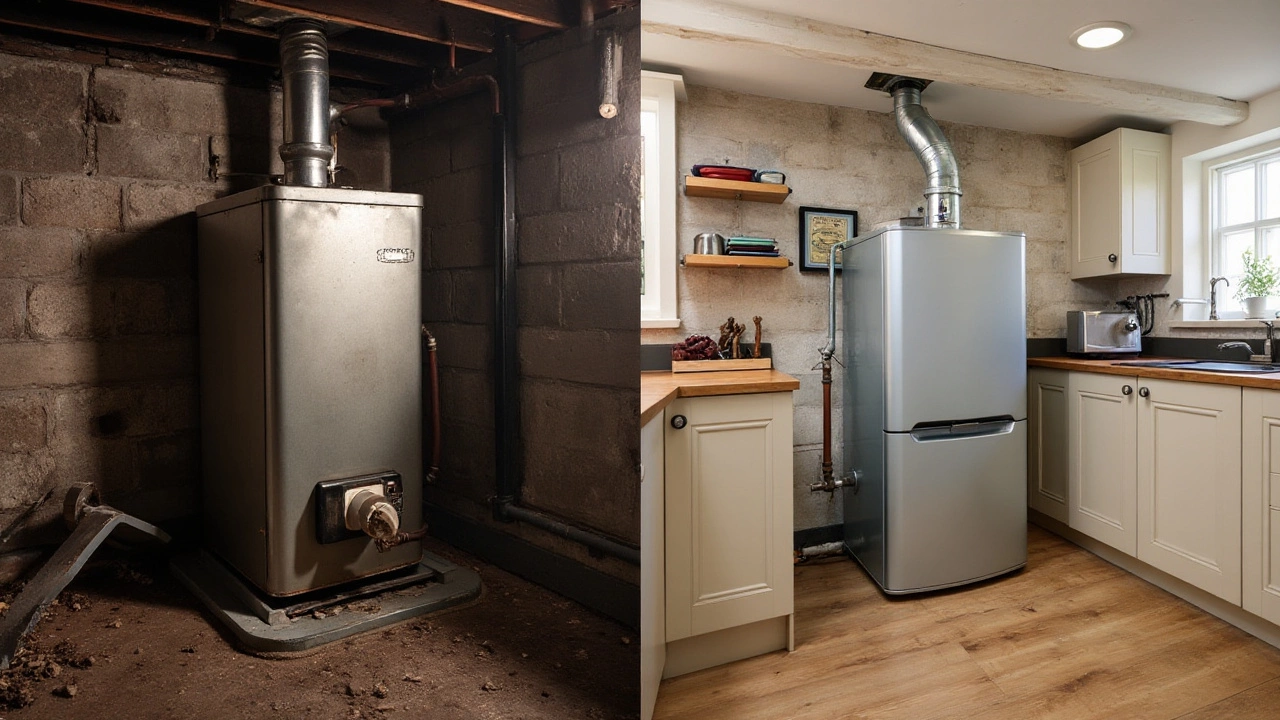
Maintenance After Installation
Once your brand-new boiler is humming along and heating your home efficiently, it’s essential not to rest on your laurels. Proper maintenance after installation ensures it runs efficiently for years to come. The first task is to familiarize yourself with the unit's specific maintenance requirements. Many modern boilers come with manuals filled with detailed, user-friendly instructions on upkeep. These guidelines are designed to help you keep the system operating at peak efficiency and to avoid unnecessary breakdowns. For instance, regularly bleeding your radiators is a simple yet crucial task that ensures there are no trapped air pockets, which can reduce heating efficiency.
Understanding the common signs of boiler distress is another component of effective boiler maintenance. For example, unusual noises such as banging or gurgling can point to issues like air in the system or impending mechanical failures. To mitigate this, conduct annual check-ups, preferably before the winter months, as part of your routine. During these check-ups, a professional should examine essential components such as the heat exchanger, burner, and ignition system. A well-maintained boiler not only provides consistent heat but can also be incredibly cost-efficient, saving you money in the long run.
Scheduling regular professional inspections is paramount. Establishing a rapport with a reliable heating specialist can make all the difference. These professionals can spot problems you might overlook, and they’ll offer peace of mind knowing your system is in expert hands. According to the Energy Saving Trust, “An efficiently managed heating system creates less carbon dioxide, impacting both your pocket and the planet positively.”
"Regular maintenance can increase a boiler's lifespan by several years, ensuring optimal performance throughout," says the Institution of Engineering and Technology.
Utilizing a dedicated maintenance plan can be beneficial. Most companies offer post-installation services that include periodic check-ups and emergencies. By choosing such plans, you harness the expertise needed to ensure your heating system keeps working without a hitch. Remember, maintaining records of every service conducted on the boiler is also crucial. These records can prove highly valuable in case of warranty claims or selling your home in the future, as they demonstrate a commitment to proper upkeep.
To help you keep track of regular maintenance tasks, consider using a simple checklist. Here’s a brief example of what some tasks might include:
- Check and adjust the boiler pressure monthly.
- Inspect and clean vents and flues to prevent blockages annually.
- Ensure the area around the boiler is free from obstruction.
- Test your carbon monoxide detectors regularly.
- Examine the pilot light color—clean any soot or deposits that might form.

